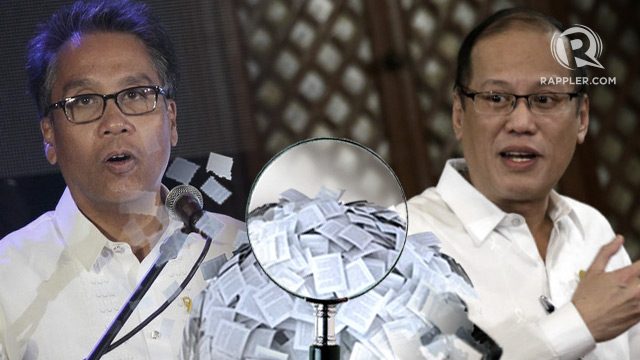SUMMARY
This is AI generated summarization, which may have errors. For context, always refer to the full article.

Since the start of the third regular session, the Freedom of Information (FOI) Committee Report has been pending the second reading since the Appropriations Committee approved its appropriation provision on March 4, 2015. In other words, the bill has had no significant progress for the past seven months, and its future prospects seem even grimmer, given the upcoming elections.
Imagine, then, how disturbing it was to have read that, on October 26, 2015, Liberal Party (LP) standard bearer Mar Roxas defended the Aquino administration from criticism that it has failed to deliver on its promise to enact an FOI law within its term. He specifically mentioned that “The point here is the president is not pushing a piece of legislation to take into consideration your view against right of reply. If the president wanted it passed to please you, this will pass – but there will be a right to reply.”
Is Mr. Roxas saying that the President is not pushing for the FOI bill as we thought he was and that the passage of the bill is conditional on the inclusion of a right of reply provision?
Correct me if I’m wrong Mr. Roxas, because I don’t understand why you’d insinuate that the President has such leanings, when from what I know, in my limited capacity as an FOI Advocate, Malacañang actually forwarded its own version of the Freedom of Information Bill to the House of Representatives back in 2012. (READ: Aquino pushes for FOI bill a day after SONA)
This version was a by-product of a consultative process conducted by an administration study group – composed of Communications Undersecretary Manuel L. Quezon III, Presidential Spokesperson Edwin Lacierda, Secretary Florencio B. Abad, and Deputy Presidential Spokesperson Abigail Valte, in coordination with stakeholders – to balance legitimate grounds for confidentiality with the public’s right to know.
Nowhere in this version was there a provision for the Right of Reply, and rightfully so given its unconstitutionality.
A right of reply in the FOI bill would be unconstitutional on two levels—first, there cannot be two subjects for a single bill passed by Congress (Art. VI, Sec.26.1); second, Art. III, Sec. 4 expressly states that Congress cannot pass a law that tramples on the right to press freedom.

Needless to say, however ‘legitimate’ you perceive coercing journalists to publish material against their will to be, it is still an infringement of their right.
The administration also publicly campaigned that the FOI bill is an integral element of laying out reforms and initiatives that pursue greater transparency, accountability, and citizen participation in governance as part of the Aquino Good Governance and Anti-Corruption Plan of 2012-2016.
Furthermore, on October 28, 2013, the administration committed to “support the passage of legislations [sic] on access to information and protection of whistleblowers” as part of their 2013-2015 Country Action Plan to the Open Government Partnership. The President also declared that he was confident the FOI bill would become law by the time he steps down in 2016 in a Daylight Dialogue last July 15, 2014.
More recently, in President Aquino’s message on the National Budget for Fiscal Year 2016, he reiterated that “greater fiscal transparency leads to a more responsive government” and urged Congress to pass the Freedom of Information Act to “ensure the permanency of transparency policies.”
Do you see now where my confusion lies, Mr. Roxas? Are you telling us that all this very public support that the Aquino administration has shown for the FOI bill was all for show? Are you insulting the President by suggesting that he and his administration is not pushing for the FOI bill and is allowing it to languish in the House of Representatives?
Or is this slip of the tongue due to a failure on your part to communicate with your running mate – who happens to be an author and staunch advocate of FOI? Or are you in disagreement with Representative Leni Robredo on the FOI?
Whatever the case, believe me when I say that I still give you the benefit of the doubt on FOI; a law that many believe can be the cement to the Daang Matuwid that this administration has supposedly tilled to curb corruption and to promote greater transparency in government. Without the FOI law, how can you say that you are for transparency and accountability? How can the public trust a government that cannot provide clear procedures for citizens to know what their government is up to?
Mr. Roxas, if you really do support FOI, perhaps you would care to know more about it and make it an important election issue. Instruct your LP representatives to show up in Congress when session resumes, do their job as lawmakers, and finally vote on it.
Instruct your campaign manager, Speaker Sonny Belmonte – who agreed to be hanged if FOI does not pass within the 16th Congress – to finally move this measure forward as he assured the advocates for the past six years.
So much of your campaign is hinged on the idea of continuing this administration’s reforms, Mr. Roxas. You, of all candidates, are in the best position to prove that you can by championing the passage of the FOI bill.
The time is now, now is your time. – Rappler.com
Karla Michelle Yu graduated from De La Salle University with a degree in Political Science and currently works at Action for Economic Reforms.
Add a comment
How does this make you feel?
There are no comments yet. Add your comment to start the conversation.